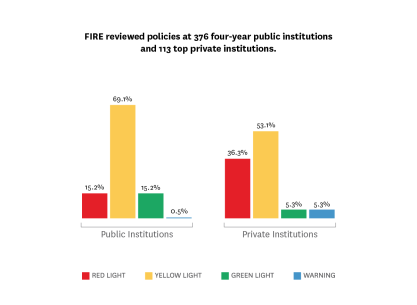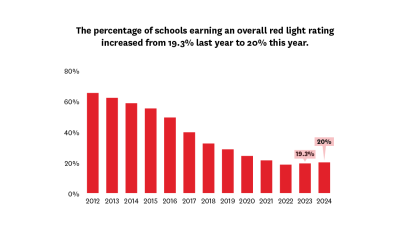Table of Contents
New FIRE report finds 85% of top colleges have restrictive speech codes

- Nearly 9 in 10 top U.S. colleges and universities have at least one policy that restricts student speech.
- Private schools tend to have more restrictive policies than public schools, even though nearly all of them promise to follow the same First Amendment standards.
- FIRE is tracking troubling announcements from schools like Yale and Stanford that they are reviewing their speech policies in the wake of the Israel-Hamas war.
PHILADELPHIA, Jan. 31, 2024 — After over a decade of progress, the number of colleges and universities with the harshest student speech codes increased for the second year in a row.
“This is not an anomaly: Free speech in higher education is getting worse,” said Laura Beltz, director of policy reform at the Foundation for Individual Rights and Expression. “America’s top colleges are increasingly turning to censorship and terrible policies to police their students’ ability to speak freely.”
FIRE’s 2024 Spotlight on Speech Codes report rates 489 of America’s top colleges and universities on the degree to which their policies restrict student speech. 85.4% of those schools have at least one policy that could be used to improperly censor students for constitutionally protected speech.
The 2024 report finds that:
- 98 colleges (20.0%) earn a “red light” rating, meaning they have at least one policy that clearly and substantially restricts freedom of speech.
- 320 colleges (65.4%) earn a “yellow light” rating, meaning they have policies that are vague or restrict relatively narrow categories of speech.
- 63 colleges (12.9%) earn FIRE’s highest rating, a “green light,” meaning they have no policies that seriously threaten student speech.
- Eight colleges (1.6%) receive a “Warning” rating, meaning their policies do not promise students free speech rights.
FIRE’s Spotlight ratings are based solely on the school’s written regulations and do not take into account a particular institution’s broader climate for free speech. Good policies can still be abused, but bad policies create a chilling effect on expression and eliminating them is a necessary first step to fostering a positive environment for free speech for years to come.
The First Amendment protects student free speech rights from violation by public colleges. The vast majority of private schools also recognize — at least in theory — that free speech is an essential component of higher education. Almost 95% of private schools in FIRE’s database make clear statements committing to protect student speech, which they are morally and contractually obligated to uphold.
Private school policies are significantly worse than public school policies across the board. 36.3% of private schools earn a red light rating, compared to 15.2% of public schools. Likewise, only 5.3% of private schools earn a green light rating, compared to 15.2% of public schools.

Even benign-sounding policies can be weaponized against students when they are overbroad or vaguely worded. Misconduct like harassment, for example, isn’t protected by the First Amendment. But many schools have “harassment” policies that go far beyond the legal definition and allow administrators to target protected speech.
Just in recent years, pro-choice students criticizing the Supreme Court’s abortion ruling were investigated for “harassment,” a student using a Donald Trump Zoom background was charged with “cyberbullying,” and a student who organized a scavenger hunt was accused of “threaten[ing] the mental health” of others. FIRE works with schools to craft policies that target misconduct like harassment without infringing on free speech.
After FIRE first began tracking and working with schools to improve their speech codes, the number of schools earning the worst red light rating steadily decreased for 15 years in a row. But now, for the second year in a row, the percentage of red light schools has slightly increased.

FIRE also helped four new schools move up to “green light” for the first time in 2023, but those victories were unfortunately outweighed by nine new red light schools. The newly minted green light schools are DePauw University, Georgia Tech, Radford University, and the University of Tulsa. Among the new red light schools are the University of Southern California, Gettysburg College, and four colleges in the Massachusetts State University system.
University speech codes came to the forefront of public attention in December, when the U.S. House Committee on Education publicly pressured the presidents of Harvard University, the Massachusetts Institute of Technology, and the University of Pennsylvania to adopt policies that punish political speech members of Congress argue “promotes genocide.” Calls for genocide that do not cross the line into true threats or harassment are protected speech, and schools adopting a “genocide” exemption would only open the door to more speech restrictions and selective enforcement.
So far, FIRE hasn’t seen these schools make concrete changes to their harassment and bias policies in reaction to the political pressure. But as more schools announce they are “reviewing” their standards, we will continue to monitor schools’ policies and work with them to fully protect student speech.
“Rather than eroding free speech protections during times of crisis, schools must strengthen their policies and apply them evenhandedly — and regardless of the political viewpoint at hand,” said Beltz. “Many schools maintain overbroad or vague policies on misconduct like true threats, incitement to violence, and harassment. Schools must ensure those policies track First Amendment standards and enforce them consistently.”
The Foundation for Individual Rights and Expression (FIRE) is a nonpartisan, nonprofit organization dedicated to defending and sustaining the individual rights of all Americans to free speech and free thought—the most essential qualities of liberty. FIRE recognizes that colleges and universities play a vital role in preserving free thought within a free society. To this end, we place a special emphasis on defending the individual rights of students and faculty members on our nation’s campuses, including freedom of speech, freedom of association, due process, legal equality, religious liberty, and sanctity of conscience.
CONTACT:
Alex Griswold, Communications Campaign Manager, FIRE: 215-717-3473; media@thefire.org
Recent Articles
FIRE’s award-winning Newsdesk covers the free speech news you need to stay informed.

Texas tramples First Amendment rights with police crackdown of pro-Palestinian protests

Here’s what students need to know about protesting on campus right now

Kansas takes a stand for intellectual freedom


